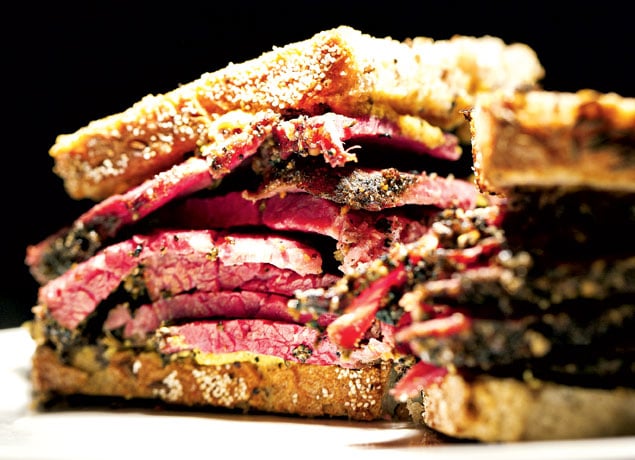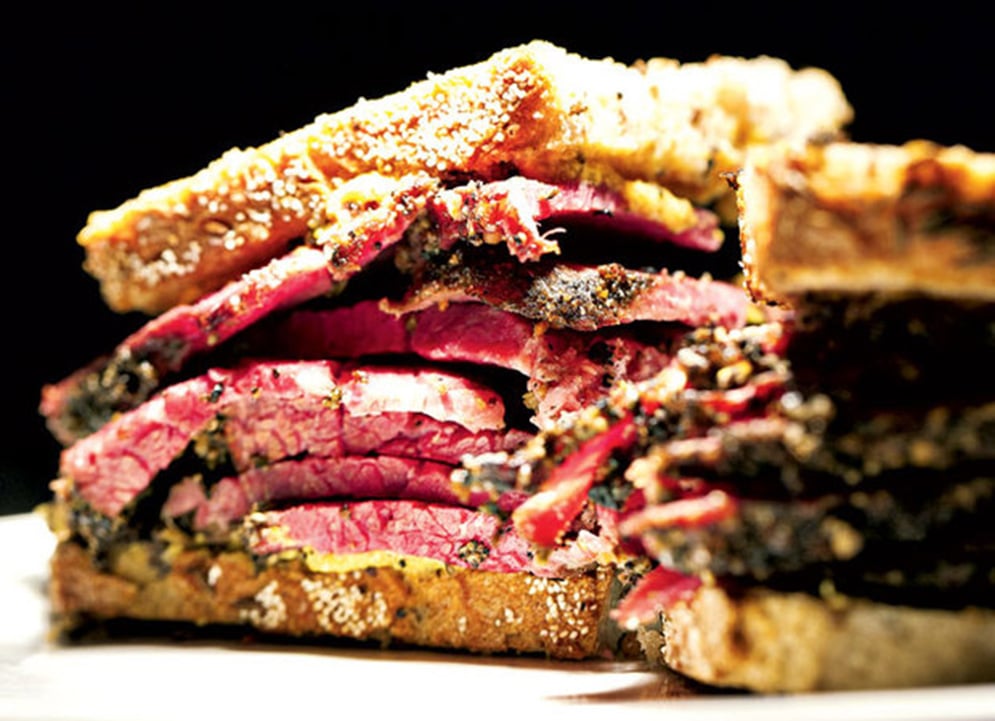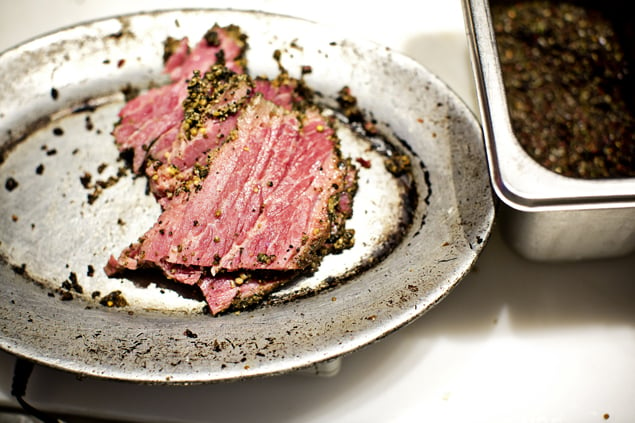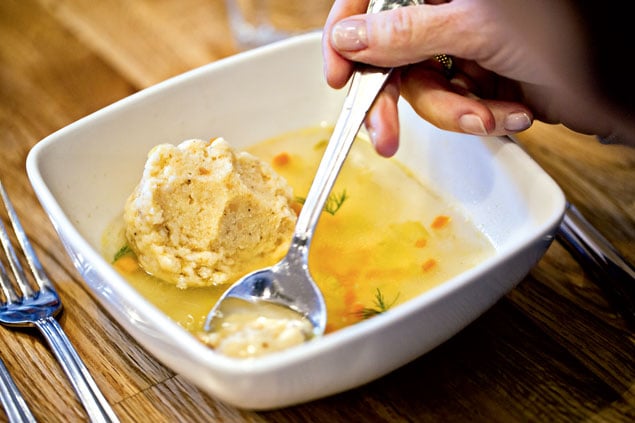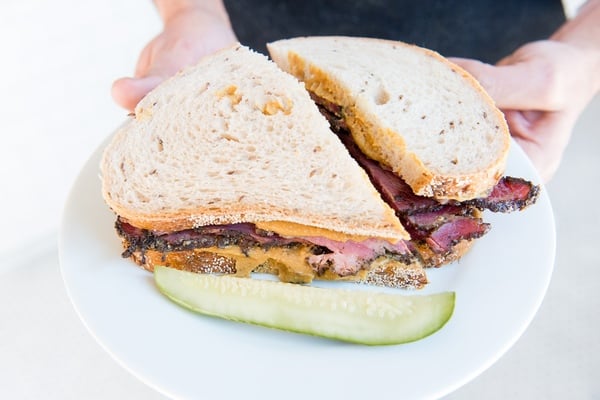About DGS Delicatessen
Slideshow: Inside DGS Delicatessen
Almost from the moment it opened in November, DGS Delicatessen
began disappointing the very people who had been waiting so long for its
arrival.
If it astonishes you to discover that a restaurant with
lovingly made egg creams, a near-perfect matzo-ball soup, and the best
pastrami sandwich this city has known could come up short in the eyes of
its core audience, then you’re innocent of the long and complicated
history of the Jewish deli. Even the house-made mustard can’t match the
zing of the barbs that have been lobbed at DGS over the past few
months.
“How can you call yourself a deli and not give the people a
corned-beef and chopped-liver sandwich?” a customer on my online chat
wanted to know. “What’s with the skimpy portions?” another griped via
e-mail. One night I was returning home from dinner with a friend when,
spotting the DGS logo, he made me pull over, desperate all of a sudden for
a slice of deli-style cheesecake. “They call this a cheesecake?” he said
when he returned, dismayed at the dainty dessert in his container. My own
mother, sitting down to a DGS dinner on another occasion, harumphed,
“What? No pickles?”
Like barbecue and gumbo, a deli brings out people’s proprietary
side. There’s only ever one right way to do things, and that’s the way
someone’s bubbe did it 50 years ago. Ten minutes into a dispute over a
corned-beef sandwich and you’ll learn that the only deli worth anything
doesn’t exist anymore, although every sandwich is forever to be judged
against its imperishable standards. No wonder so few open—who wants to
cook amid those conditions, with ghosts hovering at every turn? So give
DGS’s owners, cousins Nick and David Wiseman, credit for trying—and for
bucking long odds.
This has never been a deli town. In his 2009 book, Save the
Deli, David Sax devoted just three pages to Washington’s deli past
and present, dismissing the city as the “WASPiest place in North America.”
Stacks, which sourced its meats from the holy land of delis, Montreal, was
the last serious effort here, and it shuttered after little more than a
year.
DGS—the name pays homage to District Grocery Stores, a 1920s
Jewish collective—is far more ambitious than Stacks. The Wisemans draw
inspiration from Mile End in Brooklyn, Wise Sons in San Francisco, and
Kenny & Zuke’s in Portland, Oregon—vibrant, exciting delicatessens
that are committed to artisanality at every step.
“Artisanal Jewish deli” is the sort of phrase that elicits
snickers among the old-liners who make up a deli’s most passionate
audience, but this new breed is merely doing what its forebears did,
before the advent of commercial suppliers sapped the genre of its quality
and zest. At DGS, the corned beef and pastrami are smoked in-house rather
than bought partially cooked from conglomerates; the restaurant gets its
beef from Creekstone Farms, a small Kansas outfit that has supplied prime
beef to such chefs as Daniel Boulud and Mario Batali. The rye comes from a
local bakery and is double-baked to provide sturdiness and chew. The
pickles may not be on the house, but they’re made in-house.
The sandwich meat is sliced thick, in the manner of Montreal’s
famed smoked meat, as opposed to the shavings typical of Katz’s or Second
Avenue Deli in New York. The portions, too, are more Montreal than New
York. I know many deli lovers would regard this style as far from the
overstuffed ideal, but the open-minded are certain to be won over by the
juice-oozing richness of the meat. The corned beef has a cleanness that
comes of well-trimmed, high-quality meat, but stacked thickly between
slices of rye, it makes for as satisfying a sandwich as you could hope
for.
A deli that buys the bulk of its product would never require
more than a competent cook to oversee things, but the kitchen here is
helmed by one of Washington’s most talented chefs—Barry Koslow, formerly
of Tallula and Mendocino Grille. His matzo-ball soup demonstrates his
classical French training. (The broth is a beautiful consommé, the matzo
ball as light as a quenelle.) His borscht is an explosion of color and
flavor. Crisp latkes are good on their own, but Koslow adds silken slices
of lox and a dollop of crème fraîche dotted with salmon roe. Koslow
excelled at his previous places with terrines and pâtés. Here, the one
pâté on the menu is the chopped liver, which is lighter and better than
any version I’ve had.
Koslow and his bosses spent months studying old cookbooks in
their quest to gently update tradition. They coaxed recipes from
grandmothers and recruited food writer Joan Nathan, the doyenne of Jewish
cooking, to consult on such dishes as holishkes (beef-stuffed
cabbage in tomato sauce) and kreplach (salt-cod dumplings). For
the most part, these plates have more than novelty going for them (Koslow
has lightened them without sacrificing flavor), but they never quite
establish themselves as anything more than secondary reasons to
visit.
There can be no doubting the sincerity on the part of Koslow
and company to honor the past by including these dishes. But they speak to
DGS’s unique bind, as a deli that has to be more than a deli if it’s to
survive.
The internal contradictions are evident throughout the
operation. Take the white-tiled space—stark even by the standards of most
contemporary restaurants, as if making a point about the utilitarian
spirit of delis were more important than creating an atmosphere—or the
casual service. You might imagine that the drinks menu would follow in
this unassuming vein, but it’s as if Proof had devoured the Parkway Deli.
There are clever cocktails (I got a kick out of the Tenth Ward Cooler,
which tastes like a mojito made with celery soda), craft beers, and a wine
list that surpasses that of most restaurants of comparable size. If you
wanted to, you could bypass the sandwiches and assemble the kind of light,
pleasant meal—beet salad, smoked chicken—that you might come across in an
upscale hotel restaurant. You can see where some might become confused
about DGS, how they might take to carping and moaning.
DGS isn’t perfect; no deli is, or was. But as my own carping
and moaning grandmother might have said: So? The effort is honest, and the
craftsmanship is there. And after learning to live for decades without
good matzo-ball soup and corned beef, this professional carper and moaner
is relieved to know that he can begin, at long last, the glorious process
of unlearning.
This article appears in the March 2013 issue of The Washingtonian.

